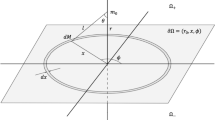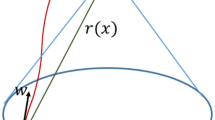Abstract
SINCE on the relativity theory mass and energy are related by the equation Mc2=W, the different energy states of an atom may be thought of as being different mass states of the atom. For example, on the quantum theory when an atom changes from an energy state Wp, to an energy state Wq, a quantum hv is radiated such that hv=Wp-Wq, (Wp being supposed greater than Wq), and hence hv may be supposed to be produced by a loss of mass in the atom as a whole. We shall therefore consider an atom to have a mass Mp before the emission of a quantum hv and a mass Mq after the emission. Each of these masses consists of the rest masses of the various parts of the atom together with the mass due to the kinetic and potential energies of the various parts. Further, although parts of the atom may be moving relatively to each other, we shall suppose that Mp and Mq are the rest masses of the atom as a whole in the two states.
This is a preview of subscription content, access via your institution
Access options
Subscribe to this journal
Receive 51 print issues and online access
$199.00 per year
only $3.90 per issue
Buy this article
- Purchase on Springer Link
- Instant access to full article PDF
Prices may be subject to local taxes which are calculated during checkout
Similar content being viewed by others
Author information
Authors and Affiliations
Rights and permissions
About this article
Cite this article
JAUNCEY, G. Conservation of Momentum and the Doppler Principle. Nature 117, 343–344 (1926). https://doi.org/10.1038/117343b0
Issue Date:
DOI: https://doi.org/10.1038/117343b0
Comments
By submitting a comment you agree to abide by our Terms and Community Guidelines. If you find something abusive or that does not comply with our terms or guidelines please flag it as inappropriate.



